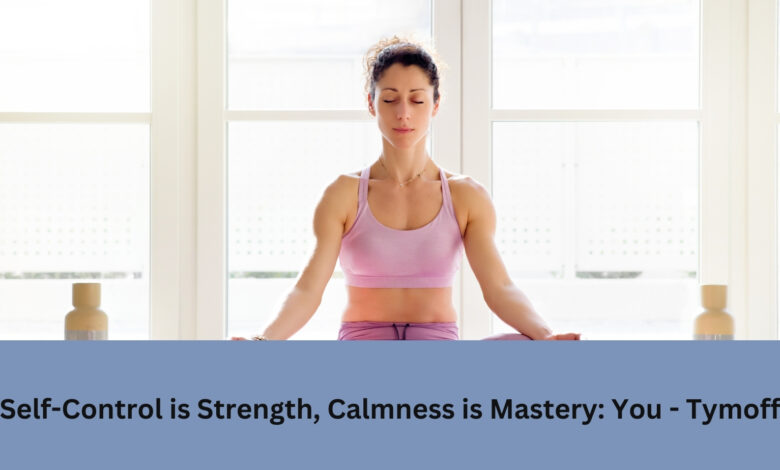Self-Control is Strength, Calmness is Mastery: You – Tymoff

In the ever-accelerating whirlwind of modern life, where the onslaught of information, demands, and expectations can feel overwhelming, the ancient virtues of self-control and calmness are more relevant than ever. These principles, encapsulated succinctly in the phrase “self-control is strength. calmness is mastery. you – tymoff ,” serve as a guiding star for individuals navigating the complexities of contemporary existence. This article delves into the multifaceted nature of self-control and calmness, exploring their implications for personal development, mental health, and societal harmony.
The Foundations of Self-Control
Self-control, at its core, is the ability to regulate one’s emotions, thoughts, and behaviors in the face of temptations and impulses. It’s a pivotal aspect of what psychologists refer to as executive function, a set of cognitive processes that include attentional control, inhibitory control, working memory, and cognitive flexibility. These capabilities enable us to plan, focus attention, remember instructions, and juggle multiple tasks successfully.
The strength of self-control lies in its capacity to empower individuals to make choices that align with their long-term goals and values, rather than succumbing to short-term gratifications or pressures. This discipline is not about suppression or denial but about mindful decision-making and self-regulation. Research in the field of psychology has consistently shown that strong self-control is linked to a host of positive outcomes in life, including better academic performance, improved physical and mental health, and higher levels of personal and professional success.
Calmness as a Form of Mastery
Calmness, often perceived as a byproduct of Self-Control is Strength. Calmness is Mastery. You – Tymoff, is a state of emotional stability and clarity that arises from a deep sense of inner peace. It is not merely the absence of stress or agitation but a proactive cultivation of a tranquil mindset. Mastery of calmness means having the ability to maintain composure and clear thinking under pressure, allowing for thoughtful and effective responses to challenges, rather than reactive or impulsive actions.
This mastery is increasingly valuable in today’s fast-paced world, where stress and anxiety are rampant. The ability to remain calm in the face of adversity is not just a personal asset; it’s a social one. Calm individuals can act as anchors in their communities, providing stability and rationality during times of turmoil. Furthermore, calmness facilitates empathy and understanding, fostering better communication and relationships.
Integrating Self-Control and Calmness into Daily Life
The integration of self-control and calmness into one’s daily life is a journey of personal growth that requires intentionality and practice. Here are some strategies for cultivating these qualities:
- Mindfulness and Meditation: These practices help develop self-awareness and emotional regulation, key components of self-control and calmness. By becoming more aware of one’s thoughts and feelings, individuals can learn to respond to situations with intention rather than react impulsively.
- Goal Setting and Habit Formation: Establishing clear, achievable goals and building supportive habits can enhance self-control by providing direction and reducing the cognitive load of decision-making. This process involves breaking down goals into manageable tasks and using self-discipline to establish and maintain productive habits.
- Stress Management Techniques: Techniques such as deep breathing, progressive muscle relaxation, and visualization can help manage stress and evoke a state of calm. Regular physical activity and sufficient sleep are also crucial for maintaining emotional balance and resilience.
- Cognitive Behavioral Strategies: These strategies involve identifying and challenging negative thought patterns that can undermine self-control and calmness. By reframing thoughts in a more positive and realistic manner, individuals can reduce emotional distress and enhance their capacity for self-regulation.
- Community and Support Networks: Building strong relationships and engaging in community can provide emotional support and accountability, reinforcing efforts to develop self-control and calmness. Sharing experiences and strategies with others can offer valuable insights and encouragement.
Challenges and Considerations
While the pursuit of self-control and calmness offers numerous benefits, it is not without its challenges. One of the primary obstacles is the misconception that these qualities are innate traits rather than skills that can be developed. This belief can lead to resignation and passivity, undermining the motivation to engage in practices that foster growth in these areas.
Additionally, the societal glorification of busyness and constant productivity can create environments that are antithetical to the cultivation of calmness and self-control. Navigating these cultural currents requires a conscious effort to prioritize personal well-being and to challenge prevailing norms that equate worth with output.
Moreover, it’s important to approach the development of self-control and calmness with compassion and flexibility. Unrealistic expectations and harsh self-criticism can be counterproductive, leading to stress and discouragement. Recognizing that progress is incremental and that setbacks are part of the journey is essential for maintaining motivation and resilience.
Must Read: Transforming Your Arms: Proven Strategies to Beat Bad Bicep Genetics and Sculpt Strong Muscles
Conclusion
In conclusion, the adage “Self-control is strength. Calmness is mastery. You – Tymoff” encapsulates profound wisdom for our times. These qualities are not relics of a bygone era but essential tools for thriving in today’s complex and fast-paced world. By embracing the principles of self-control and calmness, individuals can navigate life’s challenges with grace and determination, contributing to their personal well-being and the betterment of society as a whole. The journey toward mastering these virtues is both a personal quest and a collective necessity, offering a path to a more fulfilling and harmonious existence.



